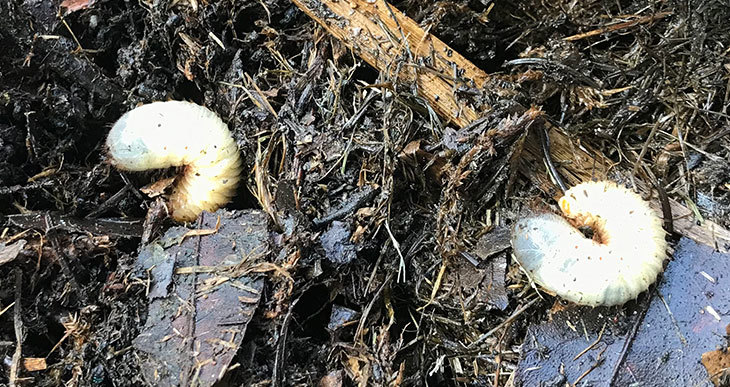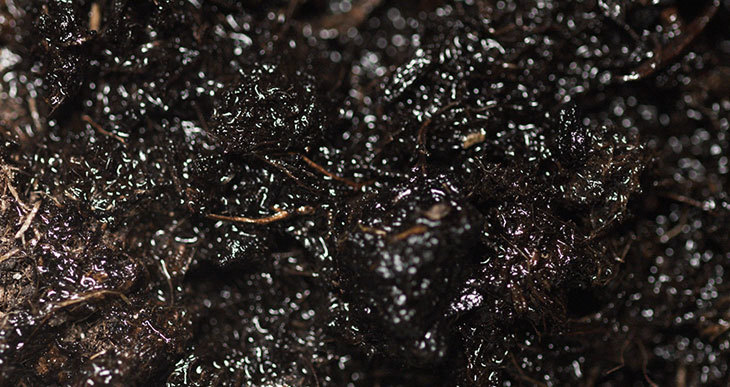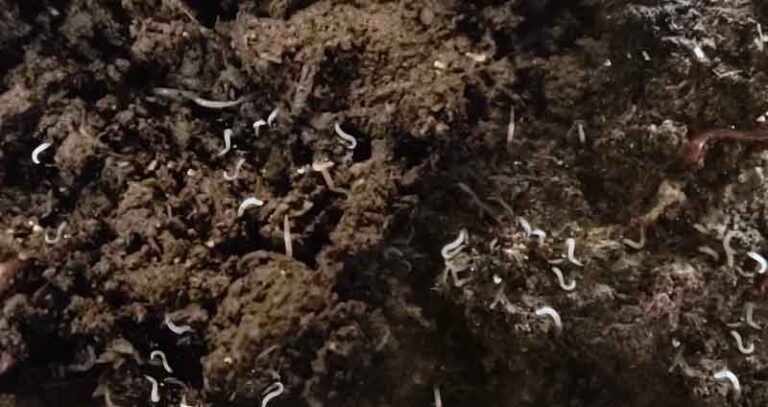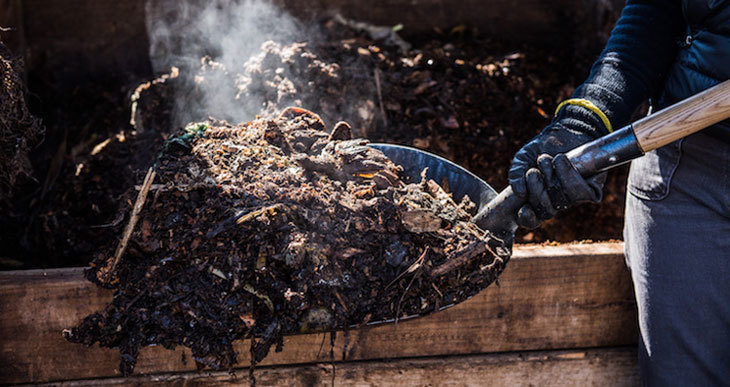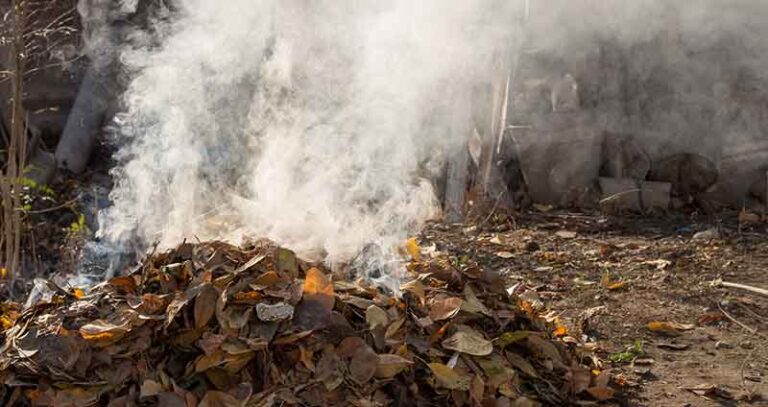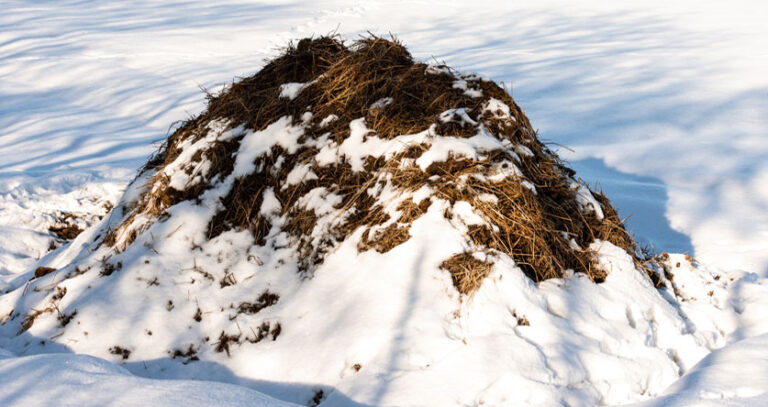Flies in Compost (Best Things To Do Now)
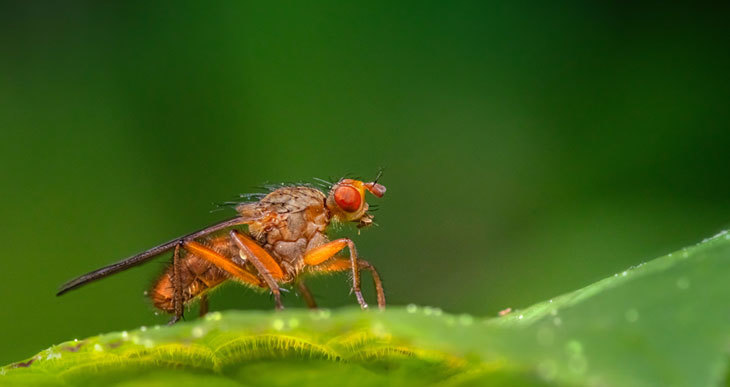
Many people avoid starting a compost bin because they don’t want to attract unwanted insects, such as fruit flies, to their garden and home.
Don’t let this possibility prevent you from producing your own nutrient-rich compost!
There are ways to discourage these critters from taking up residence in your compost bin!
Whether you call them fruit flies, or vinegar flies, these little insects are, simply put, a nuisance for anyone composting their kitchen waste. But don’t despair! We have some black-ops tactics you can use to thwart the onslaught of the fruit fly invasion in your compost bin.
Try the tips below to rid your compost of fruit flies!
Why Fruit Flies Love Your Compost
Fruit flies are from the Drosophilidae family and are generally considered nuisance insects rather than pests.
Fruit flies are less likely to spread disease, but there is still potential for this to happen, which is why we need to keep these critters out of your home. Even so, that does not make them any less annoying when they swarm your kitchen, or you find them floating in your glass of wine!
Fruit flies are part of the cycle of decomposing vegetation since the adults and their larvae eat decaying fruit. They are attracted to the smell of overripe fruit or fruit that has started to decay. Even the skins of fruit such as bananas will attract these little insects.
If you think about the material you are placing in your compost bin, it makes for a smorgasbord of delectable treats for fruit flies.
Fruit flies also prefer a moist, warm environment to lay their eggs and for their larvae to grow and develop into adult flies. Once again, doesn’t this sound just like the inside of your compost bin?
The adult flies mate and lay their eggs on the rotting vegetation in the compost bin, where the newly hatched larvae will have sufficient vegetation to feast on while they grow to adulthood.
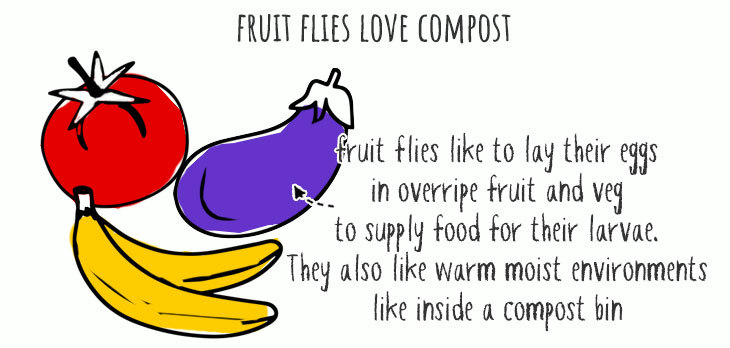
The problem is, a single female fruit fly can lay between 500 and 2000 eggs. This translates to a massive swarm of fruit flies when they hatch out, especially when you consider how many female fruit flies are laying their 2000 eggs in your compost bin.
This evokes mental images of swarms of fruit flies of biblical proportions, enough to make anyone change their minds about setting up a compost bin. But before you totally discard the idea of a compost bin, there is some good news in the whole story!
There are several things you can do to minimize the number of fruit flies, and prevent them from becoming a source of annoyance and frustration in your yard and home!
Are Fruit Flies In Compost Good Or Bad?
Despite the nuisance factor of fruit flies, these creatures are actually beneficial in the process of breaking down the organic material in your compost bin.
Like earthworms, these flies and their larvae eat the rotting and decaying vegetation, and their poop becomes a nutrient-rich fertilizer.
Consequently, having fruit flies in your compost bin can actually be beneficial to the decomposition of the organic material.
But, we want to minimize the number of fruit flies and prevent them from invading our homes!
Compost Fruit Fly Problem: When Is The Worst Time?
The Fruit fly life cycle from egg to adult takes a little more than a week, usually about 10 days.
This is why they can quickly become an infestation!
Fruit flies like warm moist conditions, with plenty of available food. This means that fruit flies can breed all year round in regions with warm climates. However, their most prolific season is towards the latter half of summer.
In natural terms, this is when there would normally be over-ripe rotting fruit on the ground under trees or decaying vegetation as summer winds down.
Why Do I Have So Many Fruit Flies In My Compost Bin?
If you are greeted by a dark cloud of swarming fruit flies every time you open the lid of your compost bin, it is safe to say you have an infestation!
The reason there are so many fruit flies in your compost bin is that the compost bin is fruit fly heaven! The microclimate inside the compost bin, combined with the readily available food and protected environment, make your compost bin as attractive as a 5-star hotel for these bugs!
Fruit flies are small, allowing them to access the compost bin through air vents or gaps where lids do not seal properly.
The question is this…
If your compost bin has become the local hangout for all the neighborhood fruit flies, what can you do to make your backyard, home, and compost bin less attractive?
How Do I Get Rid Of Fruit Flies In My Compost Bin?
If your compost bin is already infested with fruit flies, what can you do to get rid of them and prevent the next generation from perpetuating the problem?
Here are some tactics and strategies you can employ to minimize the problem and reduce the number of fruit flies.
Move your compost bin into direct sunlight.
Fruit flies like a warm environment, but not a hot one. The temperature inside the compost bin will rise quickly, killing the fruit fly larvae in the compost bin.
Create a vinegar trap for the adult flies.
Every adult fly trapped will be one less fly to breed and lay eggs. Decant apple cider vinegar into a glass jar; about an inch of liquid in the bottom will do. Add two drops of dishwashing liquid to break the surface tension. Use plastic wrap to cover the top of the jar and poke a few holes with a toothpick. The fruit flies can enter the jar but not get out and drown in the liquid. Place the trap near your compost bin.
Create a fruit trap.
If apple cider vinegar is not on hand in your home, you can create the same trap by placing some sliced fruit or a banana peel in the jar, sealing it in the same way as the vinegar trap. Place the trap near the compost bin.
Freeze kitchen waste before composting.
Fruit fly eggs and larvae can enter your home on the fruit and vegetables you purchase from the store. Before composting the scraps from these food items, place them in a plastic bag and freeze them overnight to kill any eggs or larvae and prevent introducing them to your compost.
Throw a sprig of fresh mint in your compost.
Fruit flies do not like the smell of peppermint. The fresh mint will spread its strong aroma in the compost bin and deter the fruit flies from entering.
Plant deterrent plants around your home and compost.
Fruit flies do not like the smell of basil, peppermint, lemongrass, and lavender. Planting these plants around your compost area will help to keep the fruit flies away.
Use essential oils.
Use lavender, lemongrass, eucalyptus, or peppermint essential oils to keep the fruit flies at bay for a more immediate effect. A drop or two wiped around areas where the flies could access the compost bin will keep them out. Use these essential oils in a diffuser in your home to keep them at bay.
How To Avoid Fruit Flies In Compost
Part of your strategy to combat fruit flies in your compost should include preventing them from invading your compost in the first place.
Here are a few remedies you can use that will deter the fruit flies from taking an interest in your compost pile or bin.
Layer your compost.
This basic composting principle helps deter fruit flies and improves the final quality of the compost you produce. After placing fresh organic material in the compost, cover it with a carbon layer. Dead leaves, shredded paper or cardboard, or even a layer of soil will prevent the aroma of the “green” organic material from attracting the fruit flies.
Wrap scraps before composting.
Wrap your organic kitchen waste in newspaper or butcher paper before placing it in the compost. The paper will limit the odors that attract the fruit flies, and even if they get in, they will not have access to the waste. The paper will decompose along with the scraps.
Seal your composter.
Compost needs air as part of the decomposing process, but you can seal compost bin openings to prevent fruit fly access and cover compost bin vents with mosquito netting. This allows airflow but prevents the flies from gaining access.
Conclusion
Fruit flies are not detrimental to your compost, but the rate at which they breed can result in a proliferation of these flies. They become a nuisance in large numbers and have the potential to spread germs and bacteria.
Don’t let garbage stand around. Fruit flies do not only breed in compost. They will also breed in garbage bins. Ensure your garbage is sealed in garbage bags before placing them in your outside garbage bins for collection.
Fortunately, they are fairly easily controlled but unfortunately difficult to eradicate completely. By following the strategies above, you can prevent them from becoming a problem in your compost and enjoy a glass of wine in your home without any “floaters!”


